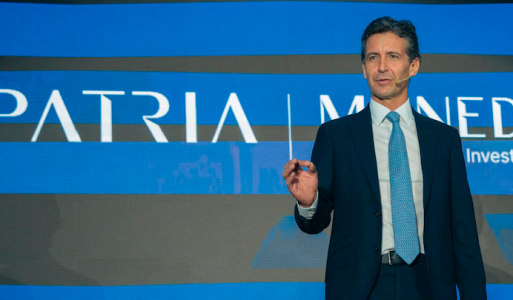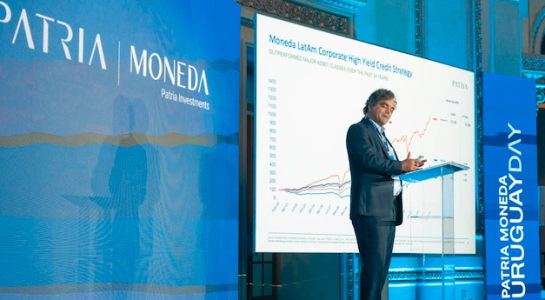Patria Moneda, the new giant of Latin American asset management, celebrated its first “Uruguay Day” in Montevideo with a promise to establish a long-term relationship with the local industry. In the luxurious setting of the Sofitel Hotel in Carrasco, the group showcased its unique strength in the region: Moneda is the largest player in Latin American bonds, and Patria is the leader in alternatives.
The firm has been in Uruguay since late 2023, and during this time, its representatives have understood the essentials: that the local private banking sector needs committed companies to invest in alternatives, and that commitment must be made in a common language to facilitate basic processes such as quick subscriptions, understanding terms, and fees. And, in the process, to stop being told that they are not “financially educated.”
An investment house rather than a commercial firm
Alfonso Duval, Partner and Head of Commercial Andean Region, began by defining his company as a platform and an investment house with 40 partners and $45 billion under management.

Patria Moneda has 13 offices worldwide. They bring global capital to Latin America and provide access to international assets for local capital. The firm has relationships with 8 of the 10 largest sovereign wealth funds in the world, with 39% of its investors from Latin America, and a strong presence of pension funds.
Latin American asset management and the new mandate of Donald Trump
The Patria Moneda event took place on November 6, with the surprise of hearing about the quick and decisive victory of Republican candidate Donald Trump in the U.S. elections. Esteban Jadresic, Partner and Chief Economist and Global Investment Strategist, offered his first analysis.
If Trump fulfills his election promises, including tax cuts, projections suggest that U.S. debt could reach 134% of GDP. Jadresic notes that the first consequence would be an appreciation of the dollar, initial growth, and, if his protectionist measures are applied, a decline in the economy in the medium term with an increase in interest rates.
Latin American countries expect this possible scenario with “stable and sound” economies, said the expert, with independent central banks and historically high interest rates.
While China announces massive stimulus measures for its economy, will Trump impose a 60% tariff on the Asian country and a 10% tariff on the rest of the world, as promised? “It would be going back to tariff levels from 100 years ago, and that won’t happen,” says Jadresic.
Latin America pays more and “defaults” less
The phrase of the day came with the presentation of Fernando Tisné, Global Head of Credit Managing Partner: this year has been good for Latin American bonds, with High Yield yielding good returns and surpassing benchmarks: “Latin America pays more and defaults less.”
The firm’s message is that there are great opportunities in Latin American public debt and in the two strategies of the firm, currently backed by 24 years in the market and a team of 50 people.

A new era for Latin American private credit
Javier Montero, Partner and Portfolio Manager Credit Latam, quickly defined a key issue for Latin America: in the region, “financing essentially comes from banks, and private credit is almost nonexistent.” Currently, around the world, a company needs credit and can impose its conditions due to fierce competition and supply. In Latin America, the main demand comes from family offices, and there is still much work to be done.
Montero believes that the business opportunity is enormous, and that after 15 years of investing in private credit (“our business is lending money”), the combination of Moneda and Patria is a winning option for investors.



